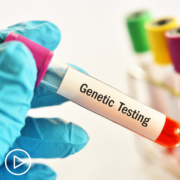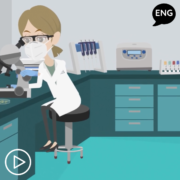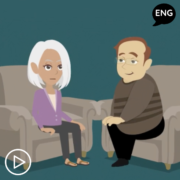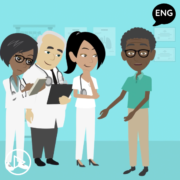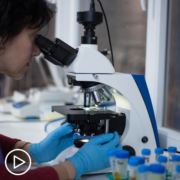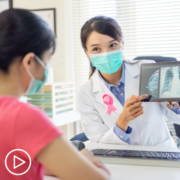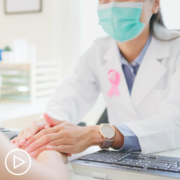A DLBCL Expert Debunks Common Patient Misconceptions from Patient Empowerment Network on Vimeo.
Dr. Kami Maddocks responds to common diffuse large B-cell lymphoma (DLBCL) patient questions and misconceptions. Dr. Maddocks encourages patients to feel empowered in their care so they can partner with their healthcare team.
Dr. Kami Maddocks is a hematologist who specializes in treating patients with B-cell malignancies at the The Ohio State University Comprehensive Cancer Center – The James. Learn more about Dr. Maddocks.
See More From The Pro-Active DLBCL Patient Toolkit
Related Programs:
Transcript:
Katherine:
It’s not always easy for patients to speak up. So, I’d like to debunk some common misconceptions that patients have, that may be holding them back. First one is, “I’m bothering my doctor with all my questions.” Is that true?
Dr. Maddocks:
That is not true at all. So, the best thing is an informed patient. So, I want to answer all their questions. “What is the disease or diagnosis?” “What are the treatment options?” “What do we know now?” “What are we learning?” I need to know what’s going on. I always tell my patients that I can’t help them with what I don’t know. So, if somebody shows up, they get once cycle of treatment and they show up for a second cycle and they’ve had all these problems and never called or notified me, first of all, we weren’t able to help them. There’s a lot of things we can do to help them and if we don’t know what’s going on, we can’t help.
And second, that might impact that second treatment, whereas knowing and knowing that sooner, we can plan to make changes.
Katherine:
Yeah. That’s really good advice. Here’s another one. “My doctor’s feelings will get hurt if I get a second opinion.”
Dr. Maddocks:
Not at all. So, I always encourage patients that they should get a second opinion, third opinion, whatever they need. Number one, I think it’s important that a patient feels comfortable with their diagnosis and their treatment plan, because I really think that things go better if they understand that and they’re comfortable. If they’re always doubting what’s going on, it’s really hard to develop that trusting relationship. And I think it’s very important that a patient has a trusting relationship with their care team.
I think most of the time, when you get a second opinion, you’re probably going to hear or get the same advice. And so, that helps a patient to feel comfortable. Sometimes, there may be clinical trials out there that your doctor didn’t know about, that are options, and a doctor’s always going to be happy if there’s something out there available, that might make the patient outcome better, that they didn’t know about.
And lastly, I would say there are a lot of doctors who treat all types of cancer, and there are some doctors that specialize in certain types of cancer. And so, if you were seeing a doctor who treats multiple different kinds, but want to see a doctor who specializes in a particular kind, they may be aware of a recent trial or a recent development that your doctor doesn’t know. Not because there’s anything wrong with that doctor, it’s just that there is so much data to keep up with these days, in cancer, that a specialist might be able to provide a point of view that somebody else doesn’t know.
Katherine:
Yeah. Another question or comment is, “There isn’t anything that could be done about my symptoms or treatment side effects. So, why should I even say anything?”
Dr. Maddocks:
Yeah. That’s a great question but the thing is, a lot of times there are things. So, the one thing is, some of the treatments we use for some of our cancers, including lymphoma, have been around for a really long time. But some of the things that have changed, are our supportive care or our ability to treat patient side effects. So, I think that it’s always important that patients let us know if they’re having side effects because maybe nausea – so, we give medication to prevent that.
Usually, I send patients home with two different types of nausea medication. But if that’s not helping, I have more than two in my toolbox, I just don’t know to prescribe them if the typical things aren’t helping. So, a lot of times, there are things that we can do. Sometimes you have to tweak the dosing of the chemo, but really, the only way you can help with symptom management is if you know somebody’s having symptoms.
Katherine:
Right. So, when somebody starts to have side effects from the treatment, should they contact their care team right away?
Dr. Maddocks:
Yes. They should contact their care team right away. There are certain side effects, like having a fever during chemo, where they really need to go to the emergency room to be evaluated, to make sure it’s nothing. Because an infection can be very serious when you’re getting chemotherapy. Other side effects that are less emergent but, yes. Most of the time there’s a patient number that patients can call, where they can seek, like a nurse help line, where they can seek assistance, and that call can be escalated depending on the symptoms and what needs to be helped.
But I think, again, it’s important that we know what’s going on so we can help patients. And then, if something needs to be further investigated – because occasionally there will be something that’ll make us think, “Oh, we really need to evaluate this patient because what if it’s more than what it seems?”
Katherine:
Right. Are there any other misconceptions that you hear about from patients?
Dr. Maddocks:
I think, just in general, thinking about the patient taking care of themselves. So, a lot of times there can be resources that patients have questions on. Things like exercise. Things like nutrition. Things in the environment that they can be exposed to. Just different things. I think it’s always important that you ask your care team if there’s any question, because they’re going to best be able to tell you versus just assuming something.
There’s a lot of good information that patients can get from educational sites. There’s a lot of good information on the internet but there’s also a lot of bad information, or inaccurate information on the internet. So, I think it’s great for patients to use resources and educate themselves but I think that it’s always good to confirm with your care team. Myths versus facts.










